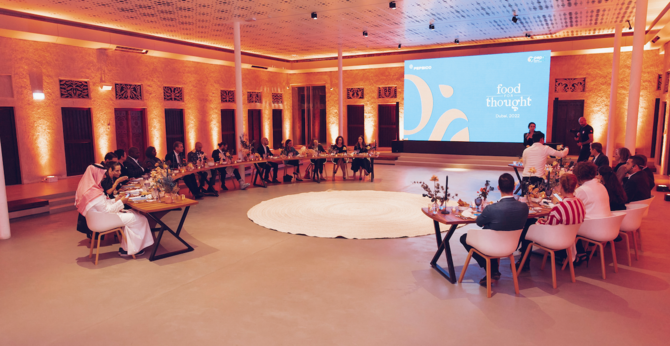RIYADH: As Saudi Arabia grapples with water scarcity, PepsiCo is leaving no stone unturned to solve the sustainability problem in the region. The company has successfully partnered with farmers to cut 25 percent of their water utility by introducing extraordinary irrigation techniques in the last few years.
“In 2022, we hope to achieve our 100 percent water replenishment target in Riyadh, and in 2023 we aim to be net water positive across the Kingdom,” Eugene Willemsen, PepsiCo CEO for Africa, the Middle East and South Asia, told Arab News. “Effectively, our ambition is to bring back to the community the same amount of water we consume throughout our food manufacturing process.”
Willemsen noted that water scarcity in the Gulf Cooperation Council had been a significant item on the region’s agenda. It has been trying to find an effective solution to this problem.
“The scarcity of water in the region, coupled with the arid climate, means that food security is a priority for the GCC countries. Governments and communities need to find creative and sustainable means of providing food to the people of this region,” he said.
Willemsen indicated that during the pandemic, PepsiCo saw several GCC countries effectively mitigate the risks of food supply shocks.
“The Kingdom specifically was able to work closely with the food and beverage industry and leverage strong partnerships with the government to ensure minimal disruption and shortages during the pandemic,” he noted.

Eugene Willemsen, PepsiCo CEO Africa, Middle East, South Asia
Countering challenges
According to the UN, more than half the planet’s fertile topsoil is now degraded. Asked how the food industry in the Middle East can counter challenges posed by this, Willemsen replied: “We have been doing this by partnering with our farmers and coming up with regenerative solutions that can help support the Middle East’s sustainability agenda.”
He added: “In response to the challenges posed by dry climates in the Middle East in terms of soil quality, we have been prioritizing the efficient use of advanced irrigation solutions. One such example has been our efforts toward achieving agricultural water efficiency in the Kingdom for the supply of potatoes used in the supply chain for the snacks business.
“We have done this by implementing storage of potatoes for summer use, introducing more water-efficient potato varieties, improving irrigation efficiency for 1,000 hectares, and expanding efficient drip irrigation methods to 500 hectares.”
With the installation of efficient irrigation technology at various growers in the Wadi Dawasir region in the fourth quarter last year, PepsiCo aims to replenish nearly 65 percent of the total water it consumes in Saudi Arabia in 2022.
Meaningful initiative
Elaborating on PepsiCo’s recently launched initiative, Food for Thought, Willemsen explained its aim is to forefront sustainability and drive meaningful change. “The Food for Thought initiative is intentionally designed differently from the traditional setup used for thought leadership,” he added. “We have redesigned conference settings and opened access to stakeholders beyond the usual public and private players.”
This inclusive platform is open and interactive, intending to democratize conversations about food by bringing together multiple stakeholders from across the food chain.
After the success of the inaugural event in Dubai, PepsiCo is looking forward to organizing the next edition in Saudi Arabia within the next six months. “We will build on these events and the ideas and emotions they generate to drive our ultimate objective of putting sustainable food at the forefront of our minds in the region as we strive for a better tomorrow,” Willemsen said.
The company will liaise with the larger community to support further action and trigger collaborations.
“We pieced together ideas on subjects that were perhaps not together before. Potential partnerships have unlocked, and conversations have begun. Overall, we are happy to have created this opportunity and look forward to furthering the impact in our next session,” informed Willemsen.
Food sustainability
According to the top executive, the food and beverage industry is at the heart of the transition to a sustainable food system.
“Through partnerships and innovations, the industry has to cater to consumer demands and needs within the sustainability model. Well-informed and collaborative partnerships are critical to paving the way forward. As the industry moves toward embracing food sustainability, multi-stakeholder partnerships play a role in driving impactful results — be it with internal audiences, consumers, industry players, or local governments,” he added.
Willemsen stressed that with emerging concerns related to climate change and a post-pandemic recovery in progress, there is a growing emphasis on reusing, reinventing, and recycling for a more resilient circular economy.
He added: “Our focus has been on positive agriculture and working toward water sustainability. To do this, we have been implementing the latest food technologies across our value chain, partnering with farmers to apply best practices and introduce more innovative ways of working. We have also been leveraging our global and local stakeholder base to change behavioral patterns by spreading awareness of impactful water-saving tactics and regenerative farming practices.”
Additionally, the company has been ensuring water access for some of its communities by implementing replenishment tactics.
“Our ambition is to become net water positive by 2030, reducing absolute water use and replenishing at least 100 percent of the water used into the local watershed,” Willemsen explained.
By all accounts PepsiCo, which has two food manufacturing sites in Riyadh and Dammam, has implemented advanced technologies and disrupted current practices with a sustainable approach led by research and development.














